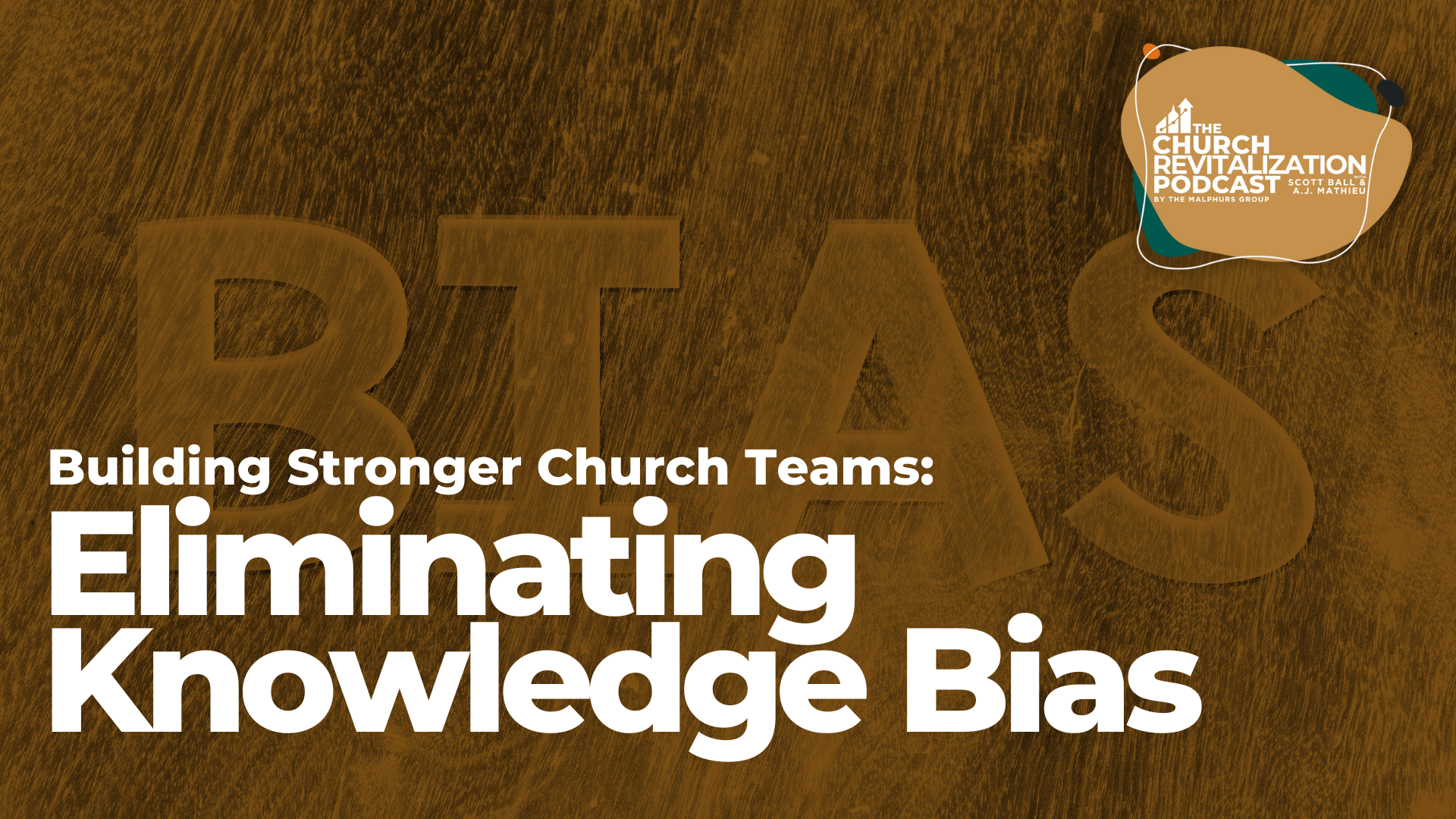The Church Revitalization Podcast – Episode 221
You might be surprised by what your team doesn’t know.
It’s an easy trap to fall into – thinking your team knows what you know or has the same level of understanding that you do. This unconscious bias of understanding can be the root cause of a lack of progress on tasks or even result in a slow pace of growth organizationally.
Unfortunately, the Church may struggle with this more than the secular business world. Businesses typically hire people for specific roles and job functions and actively seek individuals with particular education and skill sets. This process occurs mainly at the highest levels in smaller churches and at a slightly greater frequency in larger churches with more staff layers. However, the Church also encompasses multiple layers of volunteers. Moreover, churches often lack consistency in developing clear job descriptions and creating ideal candidate profiles, leading to a mismatch between expectations and reality.
So, where does this leave us? Regrettably, it leaves us with numerous assumptions regarding people’s level of knowledge and understanding. Let’s explore some of the common leadership areas in the church where ensuring our teams are properly trained can significantly benefit both the individuals involved and the Kingdom as a whole.
Subscribe below to never miss an episode.
Elder Leadership
In recent years, we’ve witnessed an increase in churches with historically congregational decision-making transitioning to an elder model of governance. Personally, I view this as a positive shift and a more biblical approach. However, it’s often the case that churches seek external help and training for their elders due to emerging conflicts or a stagnation in church leadership.
The issue frequently stems from an implied assumption about the elders’ knowledge and abilities in their specific roles. While Scripture outlines explicit qualifications for such roles, the actual function requires a more comprehensive understanding. Furthermore, modern challenges and scenarios need guidance from Scripture for 21st-century elders, though it may not provide explicit direction.
A common oversight is the extensive focus on the formation of the elder board and the character of the elders, with little to no time allocated for defining the board’s scope of work or training the elders in biblical eldership.
Mission
The mandate given by Christ to the Church is to make and mature disciples of Himself, known as the Great Commission. Yet, how many church members immediately recognize what the Great Commission entails? Contrary to what some may think, the answer is often fewer than expected.
The term “Great Commission” is increasingly unfamiliar to many. Assuming widespread understanding can lead to disappointing outcomes in initiatives that rely on participation. Even with explanations, the failure to continually teach how the mission becomes a strategy for Kingdom building often results in suboptimal results.
Discipleship
Discipleship is a term that can be either misunderstood or not understood at all. On one hand, its frequent usage in various contexts may necessitate clarification even among theologians. On the other, when discussing a discipleship pathway (the strategy for disciplining people in the church), there may be apparent agreement without a true understanding of how to build an effective strategy.
In simpler terms, people might associate one aspect of church activity with discipleship, rather than recognizing it as an integral part of all church activities. This misunderstanding can significantly impact strategy development and success measurement.
So, how do we overcome the bias of assuming our team knows what we know?
Invest in Leadership Training and Development:
To combat the assumption that everyone has the same level of understanding, it’s imperative to invest in comprehensive leadership training and development programs. This involves providing ongoing and diverse training opportunities for all key roles, including elders, mission and outreach leaders, and discipleship coordinators. Training should cover not just theological concepts and scriptural interpretations, but also practical skills like effective communication, conflict resolution, and community engagement strategies.
Such programs could include regular workshops, seminars, and even accredited courses in theology and pastoral leadership. Additionally, it’s beneficial to facilitate mentorship programs, where experienced leaders can guide newer members, sharing insights and experiences. This approach helps in building a deep, shared understanding and fosters a culture of continuous learning and improvement.
Moreover, incorporating feedback mechanisms into these training programs allows for constant refinement and ensures that the training remains relevant and impactful. It’s also important to recognize and address different learning styles among team members, using a mix of lectures, interactive sessions, and hands-on activities to engage everyone effectively.
Emphasizing cross-functional training can also be valuable, where leaders are exposed to different aspects of church operations and governance. This not only broadens their perspective but also enhances team cohesion and understanding across different church functions.
Encourage Two-Way Communication:
Effective leadership in the church is not just about disseminating information; it’s about fostering an environment where open, two-way communication is the norm. Encouraging dialogue between leaders and team members is key to bridging knowledge gaps and building a stronger, more cohesive team. This can be achieved through various initiatives:
- Regular Team Meetings and Open Forums: Schedule frequent meetings where team members can discuss ongoing projects, share ideas, and raise concerns. These meetings should be structured to allow for open dialogue, encouraging everyone to contribute. Additionally, hosting open forums or Q&A sessions with church leadership can provide a platform for addressing broader questions and concerns.
- Active Listening: Train leaders in the art of active listening. Workshops can be conducted to enhance leaders’ ability to listen empathetically and respond constructively. This skill is crucial in understanding the needs and perspectives of team members and in fostering a culture of mutual respect and collaboration.
- Mentorship Programs: Implement mentorship programs where less experienced team members are paired with more seasoned leaders. This one-on-one interaction can be a powerful tool for knowledge transfer and for building strong relationships within the team.
- Open Door Policies: Encourage leaders to adopt an open door policy, making themselves available to team members for informal discussions. This approach can help in breaking down hierarchical barriers and in promoting a more approachable and responsive leadership style.
By prioritizing two-way communication, church leadership can significantly enhance understanding and collaboration within the team, leading to more effective ministry and a stronger sense of community.
Evaluate Understanding through Surveys, Meetings, or Informal Check-Ins:
Regularly assessing the team’s understanding of key concepts, strategies, and goals is crucial. This can be done through surveys, formal meetings, or even informal check-ins. Asking team members to articulate these elements in their own words can help identify areas where more clarity is needed. This approach not only reveals knowledge gaps but also encourages active engagement with the material.
- Feedback Mechanisms: Implement a system for continuous feedback, allowing team members to express their understanding and concerns.
- Regular Performance Reviews: Conduct periodic reviews where team members can discuss their roles, understanding, and any areas where they need more support.
- Create a Safe Environment for Questions: Foster an environment where asking questions and admitting uncertainty is encouraged and valued, as it leads to collective growth and better understanding.
It’s important to cultivate an environment where continuous learning and personal growth are valued. Leaders should model this by humbly admitting their own knowledge gaps and actively seeking to expand their understanding. This behavior encourages team members to also acknowledge areas where they need growth and fosters an atmosphere of mutual support and learning.
- Promote Continuous Education: Encourage leaders and team members to pursue ongoing education, whether through formal courses, workshops, or self-study.
- Share Learning Experiences: Create opportunities for team members to share what they’ve learned, whether it’s from a recent seminar, a book they’ve read, or an online course.
- Encourage Reflective Practices: Introduce practices such as journaling or group reflections, where team members can contemplate and discuss their learnings and experiences.
Develop Clear Job Descriptions and Required Competencies for All Leadership Roles:
Whether for staff or volunteers, having well-defined job descriptions and required competencies is crucial. This clarity helps set expectations right from the start and ensures that individuals are aware of the knowledge and skills required for their roles.
- Standard Operating Procedures and Manuals: Develop comprehensive manuals and standard operating procedures for roles like elders and other boards. This resource can serve as a guide for expectations, responsibilities, and processes, helping to alleviate misunderstandings and providing a clear reference point.
- Regular Review and Update of Role Descriptions: Ensure that job descriptions and competencies are regularly reviewed and updated to reflect any changes in expectations or church needs.
- Orientation and Onboarding Sessions: Implement thorough orientation and onboarding processes for new team members, where they can become familiar with their roles, the church’s culture, and the expectations placed upon them.
–
The transition from unconscious assumptions about shared understanding to a proactive approach in assessing, developing, and evaluating knowledge is essential in church leadership. This shift is not just about enhancing individual capabilities; it’s about strengthening the collective wisdom and effectiveness of the entire church community.
To achieve this, church leaders must embrace a mindset of continuous improvement and open communication. It involves recognizing that learning and development are ongoing processes, not one-time events. By investing in comprehensive training programs, encouraging open dialogue, and regularly evaluating understanding, leaders can ensure that their teams are not only knowledgeable but also aligned with the church’s mission and vision.
Furthermore, adopting a culture of lifelong learning where curiosity and humility are valued, and where questions and discussions are encouraged, is crucial. This culture helps in building a resilient and adaptable team, capable of navigating the complexities of modern church leadership.
Equally important is the clarity in roles and expectations. Clear job descriptions and competency requirements help in setting the right foundation for every team member, whether staff or volunteer. This clarity aids in reducing misunderstandings and ensures that everyone is aware of their responsibilities and the skills needed to fulfill them effectively.
Ultimately, the goal is to create a leadership framework within the church that is dynamic, informed, and responsive to both the spiritual and practical needs of the congregation. By moving away from assumptions and towards a more intentional and structured approach to knowledge and understanding, church leaders can foster a more effective, unified, and impactful ministry.
In conclusion, the journey towards overcoming unconscious biases in understanding is ongoing and requires dedication and commitment. However, the rewards of a more knowledgeable, cohesive, and effective leadership team are immeasurable, not just for the church itself but for the wider community it serves.


A.J. Mathieu is the President of the Malphurs Group. He is passionate about helping churches thrive and travels internationally to teach and train pastors to lead healthy disciple-making churches. A.J. lives in the Ft. Worth, Texas area, enjoys the outdoors, and loves spending time with his wife and two sons. Click here to email A.J.

